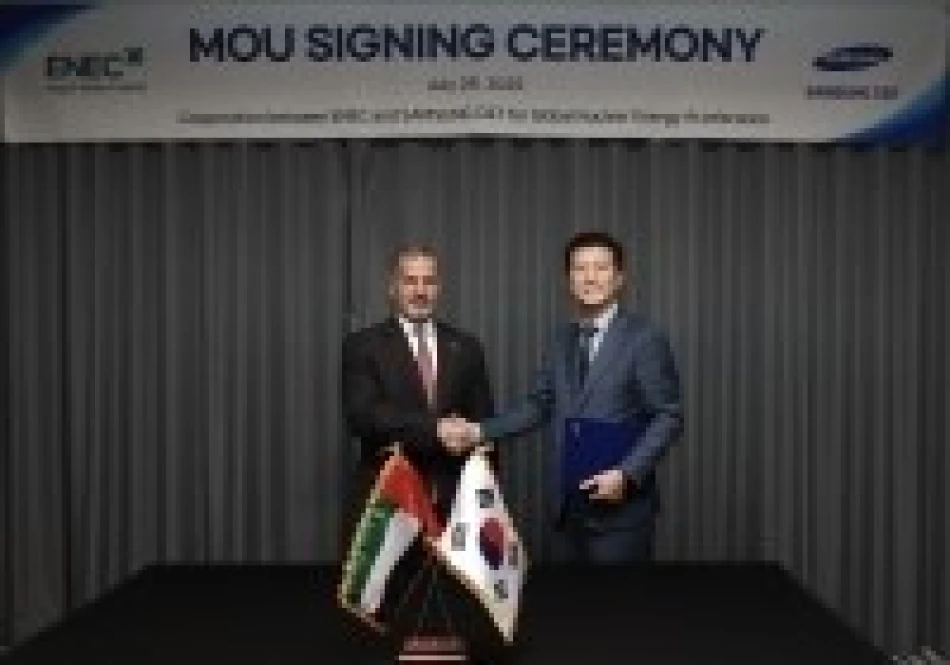
UAE Nuclear Energy Agency and Samsung Explore Investment Opportunities
UAE Nuclear Giant Partners with Samsung to Chase Global Clean Energy Opportunities
The Emirates Nuclear Energy Corporation (ENEC) has signed a memorandum of understanding with Samsung Engineering & Construction to explore joint nuclear energy investments worldwide, marking a significant expansion of the UAE's nuclear ambitions beyond its domestic Barakah plant. The partnership targets opportunities across the United States, Romania, and South Korea, positioning both companies to capitalize on the global nuclear renaissance driven by climate commitments and energy security concerns.
Strategic Alliance Targets Multiple Markets
The collaboration encompasses several high-value opportunities that reflect the current nuclear industry landscape. Key areas include potential investments in new nuclear power plant construction, restarting dormant facilities, and mergers and acquisitions in the United States—where aging nuclear infrastructure presents both challenges and opportunities for international investors.
The partnership also focuses on developing small modular reactor (SMR) technologies in the UAE, United States, and internationally. SMRs represent the industry's next frontier, promising lower capital costs and enhanced safety features compared to traditional large-scale reactors. This technology could prove particularly attractive to countries seeking nuclear power without the massive upfront investments required for conventional plants.
Nuclear Hydrogen: The Next Energy Frontier
Perhaps most intriguingly, the agreement includes exploring nuclear-powered hydrogen production opportunities in South Korea and other markets. This represents a cutting-edge application where nuclear energy could produce clean hydrogen for industrial processes, transportation, and energy storage—potentially creating a new revenue stream that extends nuclear power's value beyond electricity generation.
The timing aligns with South Korea's renewed nuclear enthusiasm under President Yoon Suk-yeol, who reversed his predecessor's nuclear phase-out plans and committed to expanding the country's nuclear capacity to meet carbon neutrality goals by 2050.
Romania Project Signals European Ambitions
The joint evaluation of a Romanian nuclear power plant project deserves particular attention. Romania has been seeking international partners to expand its Cernavoda nuclear facility, and this UAE-Samsung collaboration could provide the financial backing and technical expertise needed. For the UAE, this would mark its first major nuclear investment in Europe, demonstrating how successfully operating the Barakah plant has enhanced ENEC's international credibility.
Market Implications and Investment Logic
This partnership reflects broader market dynamics favoring nuclear energy investments. Unlike renewable sources, nuclear power provides baseload electricity generation, making it increasingly valuable as countries phase out coal and natural gas. The UAE's approach—leveraging operational success at home to pursue international opportunities—mirrors strategies employed by other nuclear operators like France's EDF and Russia's Rosatom.
For investors, the ENEC-Samsung alliance signals confidence in nuclear power's long-term prospects despite historically challenging project economics. Samsung's engineering expertise combined with UAE capital could create a formidable competitor in international nuclear markets, particularly in regions where Western companies face political constraints or financing challenges.
Beyond Electricity: Nuclear's Expanding Role
The agreement's emphasis on nuclear hydrogen production and SMR development indicates both companies recognize that future nuclear success requires diversification beyond traditional electricity generation. Countries like Japan and Germany are investing heavily in hydrogen economies, creating potential export markets for nuclear-produced hydrogen.
Mohamed Al Hammadi, ENEC's CEO, emphasized nuclear power's "pivotal role in providing clean electricity at scale," while Samsung's leadership highlighted nuclear energy as a "reliable primary energy source." These statements reflect industry confidence that nuclear power will play an expanded role in global decarbonization efforts, despite ongoing debates about costs and safety.
Competitive Positioning in a Changing Landscape
This partnership positions the UAE as a serious player in global nuclear markets, moving beyond its role as a nuclear newcomer to become an active investor and developer. The collaboration with Samsung—a company with significant nuclear construction experience—provides technical credibility that pure financial partnerships might lack.
As climate commitments drive renewed interest in nuclear power worldwide, the ENEC-Samsung alliance could capture opportunities that traditional nuclear powers like France and the United States struggle to pursue due to domestic political constraints or regulatory complexities. The UAE's 2050 carbon neutrality goal provides additional strategic alignment, ensuring that international nuclear investments support domestic climate objectives.
Most Viewed News

 Layla Al Mansoori
Layla Al Mansoori






